TME > Audio > Tributes Discography
The Theme Tune
Rather surprisingly, given the avant-garde nature of the original BBC theme and the other-worldly sounds of the Radiophonic Workshop, nearly all the spin-off and tribute records relating to Doctor Who during the first 10 years of the show were orchestral renderings of the theme tune. As you might expect, a lot of them are jolly cheery, and none of the arrangements are concerned with sounding eerie, suspenseful, dramatic or adventurous; Murray Gold they certainly ain't. They hark back to a time when children's television was full of marionettes, hand puppets and simple cartoons, when families were more likely to tune into Listen with Mother on the radio than they were to switch on the television. Collectively, they give the impression of putting Doctor Who firmly in its place!
1964 - Eric Winstone & His Orchestra
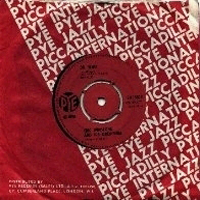 Eric Winstone & His Orchestra: Dr. Who
Eric Winstone & His Orchestra: Dr. Who
7" vinyl single, February 1964
Pye Records 7N 15603
A. Dr. Who
B. Pony Express
Arranged by Sid Dale
--> Compilation Releases
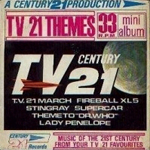 TV 21 Themes TV 21 Themes 7" EP, 1966 (Century 21 MA 105) |
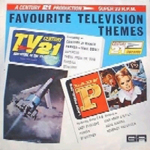 Favourite Television Themes Favourite Television Themes 12" UK LP, 1966 (Century 21 Records LA 6) |
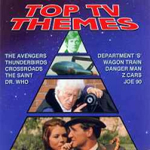 Top TV Themes Top TV Themes Budget CD, 1993 (Castle Communications MACCD152) |
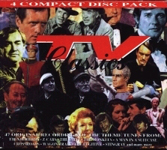 TV Classics TV Classics 4-CD Set, 1993 (Castle Communications MBSCD 412) |
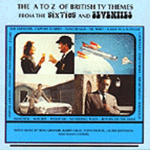 The A to Z of British TV Themes The A to Z of British TV Themes CD, 1994 (Play It Again PLAY 004) |
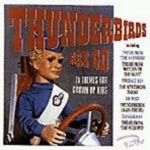 Thunderbirds Are Go Thunderbirds Are Go CD / Cassette, early 90s (Castle Music/Pulse PLSCD/MC 195. Re-issued 1999 with alternative sleeve) |
 The Avengers and Other Top Sixties TV Themes The Avengers and Other Top Sixties TV Themes Double CD / Triple LP, 1998 (Sequel Records NEMCD 976) |
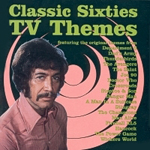 Classic Sixties TV Themes Classic Sixties TV Themes CD / Cassette, 1999 (Castle Select SELCD / SELMC 561) |
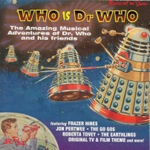 Who is Dr Who Who is Dr Who Compilation CD, October 2000 (Cherry Red / RPM Records RPM 200) |
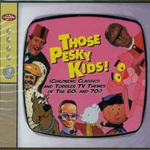 Those Pesky Kids! Those Pesky Kids! Double CD, 2001 (Castle Music CMDDD231) |
and
Compilation 'Timeless TV Themes' CD / Cassette, January 1995 (Kax Records TRTCD/C122, not shown).
/ DJ Yoda Remix
2001 - Yoda Meets Dr Who (Remix of Eric Winstone Theme)
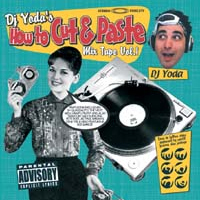 All tracks mixed by DJ Yoda
7,10,19,25,32 by DJ Yoda and Bob James |
DJ Yoda: How to Cut & Paste
CD, 1 October 2001
Antidote Records (subsidiary of Castle) ANTCD100
1. | Intro | 2. | It's a Stickup Drummond, Willus | 3. | Irritating Dove Cymande/Bob James | 4. | Eye on the Gold Chain (1992 mix) Ugly Duckling (2) | 5. | Gotta Rock Stupid Poo & Treacherous 3/Kool Moe Dee | 6. | Scratch Skit 1 DJ Plus One | 7. | Mexican Policemen at the Alien Mardi Gras | 8. | Yoda Meets the Thunderbirds | 9. | Roll With the Yaggfu Yaggfu Front | 10. | Dunes and Sounds | 11. | Scratch Skit 2 DJ Benny G | 12. | Deltaebonics | 13. | Give It to Y'all Rock, Pete & Rocky Marciano/Trife | 14. | Perverted Disturbances Cymande/Rimshots/Bob James | 15. | Salvation Barmy MC Paul Barman | 16. | Scratch Skit 3 DJ A-Track | 17. | Sesame Sex | 18. | Global Warming Nextmen & Kerosene | 19. | Jiving Question Remains | 20. | Mysterons Theme Barry Gray Orchestra | 21. | Something for the People Nigo & Biz Markie | 22. | Sugarhill Commercial Various Artists | 23. | Scratch Skit 4 DJ Spinbad | 24. | Dizzy Gillespie Plays the Sax Dizzy Gillespie/Cymande/Parliament | 25. | Balti Taxi | 26. | Astronaut Quasimoto | 27. | Yoda Meets Dr Who | 28. | On the Reggae Lar & Dennis Alcapone/Desmond Dekker/Harry J Allstars/Sly & The Revolutionaries/Roots Radics | 29. | Back Up King Tee & Phil The Agony | 30. | Golf Food and Scratching Fatback Band/Mother Freedom Band/Cymande | 31. | Mic Manipulator Edan | 32. | French Collection | 33. | Goin' to See My Baby Car Trouble & William De Vaughan/Fatback Band | 34. | Automobile Parliament | 35. | Scratch Skit 5 | 36. | Outro |
|
"Ah, I really hate the name Yoda actually," says the London-based DJ Duncan Beiny. "There was this toy, this huge kind of Yoda in my bedroom when I was younger; it used to sit next to my turntables. I really wish I hadn't been stuck with that, but there's really not much I can do at this stage!" Aged 24 when Cut & Paste hit the shops, DJ Yoda had already become an affectionate favourite of many hip-hop producers and DJs for his humourous copyright-dodging mix tapes, and recognising his potential, Castle Music offered him a record deal - and full access to their back-catalogue. "I made my first tapes for myself, I made my second tape for my mates, I made my third tape and did ten copies of it and sold them in Deal Real records in London," explained Yoda shortly after the CD's release. "The tape after that was 20 tapes, the tape after that 50, the tape after that 100, then 500, then a thousand, then two thousand, and now the CD. It just kind of doubles each time."
"I was approached by Castle Music, who own an entire catalogue of funk breaks and videos. They'd heard "Jews Paid" [the last of the unofficial mix tapes], and could see that I could come up with some hotness using their catalogue." As well as contemporary tunes and scratchings from prominent DJs, Yoda's tapes and commercial CD also embraced the cult world of TV themes, particularly those from his '80s childhood. "Computer games were good. Children's TV was good. The Pet Shop Boys were good. Most things were generally better in the 1980's." With clearances coming from Sanctuary Records, the tunes required for Cut & Paste were lifted from their own TV Themes compilations, which mostly featured orchestral or cover versions of the themes - including the Eric Winstone version of the Doctor Who theme.
The Winstone theme hasn't sounded so good since it was re-speeded for the Century 21
Daleks EP - this is short, fast and funny, and at just 1:43 we can't help putting it on a loop. Some of the quotes running over the top are throwaway lines ("Yoda!" shouts someone, quickly followed by "Isn't he a famous art dealer?"), while some play for a while and provide perfectly cheesy narration to one of the least appropriate arrangements of the Who theme to date. The cowbell and horns bombast of Eric's orchestra are accompanied at one point by a droll American voice, apparently questioning the devotion of Star Trek fanatics: "How can a simple space opera, with blinking lights, and zap guns, and a hob-goblin with pointy ears, reach out and touch the hearts and minds of literally millions of people?" DJ Yoda gives a delightfully appropriate answer, with a closing sample about "...peaches and apples and figs and pineapples and... what? Chocolate candy trees?" that speaks volumes about the simple, cheesy, though heartfelt charm of fantasy worlds. Completely daft.
Among the other themes incorporated into this CD are the Barry Gray compositions for Thunderbirds and Captain Scarlet and the Mysterons, the smaltzy American strains of Sesame Street, and liberal doses from a Star Wars talking book. A follow-up to the CD, Cut & Paste Part 2, was released in August 2002. DJ Yoda continues to play around the globe.
Being practically as old as Doctor Who itself, this vintage orchestral recording of the theme music certainly isn't hard to come across. It's been packaged so often on 60s and 70s TV theme compilations that finding the original record - once touted as a collectable item worth in excess of £50 - now seems rather unnecessary (unless you're desperate for the B-side, a jolly little Western tune that has never been re-issued). According to the sleeve notes from one CD, Winstone was a band-leader and arranger who worked extensively for BBC Radio and Southern Television, as well as undertaking summer season engagements at Butlin's Holiday Camps. The arrangement is bombastic and noisy, with cow-bell percussion, a theremin melody and an unusual preference for the middle section of the theme.
As one of our early reviewers once remarked, Eric Winstone makes Doctor Who sound like a Gerry Anderson series, and you'd be forgiven for thinking that it actually was. The recording opened and closed British copies of the Century 21 EP "The Daleks" in 1966 - a series of records more usually dedicated to Anderson shows. It blends invisibly amongst the themes from Thunderbirds, Stingray, Captain Scarlet and Fireball XL5 on dozens of recent compilation CDs. And according to several sources, Supermarianation composer Barry Gray actually provided "electronic effects" for the record, although these seem to be limited to the theremin to our ears and we wouldn't be surprised if people weren't getting muddled with the 60s Dalek movies, for which Gray definitely provided electronic effects and music, as he isn't credited on the record!
1972 - Cy Payne & His Orchestra
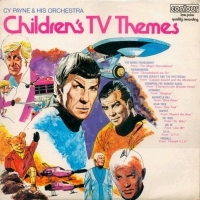 All Titles arranged and conducted by Cy Payne
A 'Norman Newell' Production
Produced by Gil King |
Cy Payne & His Orchestra: Children's TV Themes
12" vinyl LP, 1972
Contour Records 2870 185
SIDE ONE
1.
Dr. Who from "Dr Who"
2.
Thunderbirds from "Thunderbirds Are Go"
3.
Rupert from "Rupert The Bear"
4.
Fireball from "Fireball X.L.5."
5.
Stingray from "Stingray"
6.
Barnicle Bill from "Blue Peter"
SIDE TWO
1.
Star Trek from "Star Trek"
2.
The Magic Roundabout from "The Magic Roundabout"
3.
Joe 90 from "Joe 90"
4.
Captain Scarlet and the Mysterons from "Captain Scarlet and the Mysterons"
5.
Champion the Wonder Horse from "Champion the Wonder Horse"
6.
U.F.O. from "U.F.O." |
Cy Payne and his Orchestra provide generally laid-back arrangements of an assortment of TV themes, many of which had already been issued by alternative artists as unofficial tie-in singles. Payne's arrangements are often closer to these alternative versions - his Fireball XL5 track, for example, imitates the Flee Rekkers' electric guitar-led instrumental rather than the TV theme. Others, however, appear to have been re-arranged by Payne himself - the big band version of The Magic Roundabout and the Hammond organ-drenched Star Trek proving particularly memorable. Thankfully his arrangement of the Doctor Who theme does not aspire to the Winstone alternative but to the 1964 Decca Records single of the Delia Derbyshire/BBC Radiophonic Workshop demo, which Payne orchestrates with a bass guitar, electric organ and a faithful wind and strings section, producing a relaxing and unassuming rendition ideal for home listening.
Who is Dr Who, the compilation CD produced by Mark Ayres and released on Cherry Red's RPM label in November 2000, attempted to mention Cy Payne's arrangement in the sleeve notes: "Cover versions of the theme tune are included only if they were released as singles, but not if they are just part of a wider theme compilation (so, no Cy Town or Geoff Love)." Unfortunately Ayres had Mr Payne and his Orchestra confused with Cy Town, Dalek operator and actor. "Oh well," Ayres responded, "what would a release be without an error or two...?"
1972 - Uncredited Orchestra

The sleeve is dated 1964, while the record sticker is copyrighted 1972. The inclusion of themes from Magic Roundabout (1965), Captain Scarlet (1967), Trumpton (1967), Sesame Street (1969) and Scooby Doo (1969) suggest that the later date is correct.
|
Golden Hour Of Children's TV Themes
12" vinyl LP, 1972
Pye Records GH547
SIDE 1
1. | Sesame Street |
2. | The Tra-La-La Song
|
3. | Play School
|
4. | Magic Roundabout
|
5. | Rupert the Bear
|
6. | The Cuckoo Clock
|
7. | Joe
|
8. | Trumpton
|
9. | Hatty Town
|
10. | Felix the Cat
|
11. | Lollipop Loves Mr Mole
|
12. | Sir Prancelot
|
13. | Old MacDonald
|
14. | Parsley
|
15. | Jackanory
|
16. | Oh Susanah
|
17. | Shaun the Leprechaun
|
18. | Andy Pandy |
SIDE 2
1. | Dr Who |
2. | Scooby Doo (Where Are You)
|
3. | Thunderbirds
|
4. | Bonanza
|
5. | Aqua Marina (from Stingray)
|
6. | Captain Scarlet
|
7. | The Virginian
|
8. | Lidsville
|
9. | Pink Panther
|
10. | Song of the Diddymen
|
11. | Maverick |
|
--> Additional releases
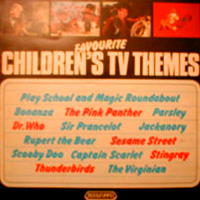 Favourite Children's TV Themes Favourite Children's TV Themes 12" Vinyl LP, 1974: Boulevard, 4153. "Hearing the music regularily, children soon become attached to it", said the sleeve, "and it is for them that this album has been compiled, since it enables them to play their favourite pieces as often as they like." |
 Music from Thunderbirds and Dr Who Music from Thunderbirds and Dr Who 7" Vinyl EP, 1975: Damont Records Ltd. / Happy Time HT 12. Titled 'Dr. Who and Space Adventures' according to the record label. |
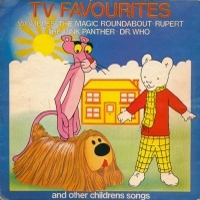 TV Favourites TV Favourites 12" Vinyl LP, 1975: Damont Records Ltd. / Happy House HH 510 (UK); Music For Pleasure MFP 7033 (Australia). The UK record sticker features the alternative title 'Children's T.V. Favourites and Other Children's Songs' |
First released by Pye Records as part of their Golden Hour series, then by Damont
Records on their Happy Time label, these poorly produced orchestral recordings were
consistently unaccredited. Although the tracks are musically faithful to their
original television themes, the over-orchestration of some pieces leaves the record
sounding flat and unimaginative. The Doctor Who theme is performed by a full orchestra and a variety of electronic instruments, but the mixing favours the brass section over the strings and results in a heavy and plodding track. Interestingly, the 1975 EP version fades out 5 seconds earlier than the two LP releases, ending on a unique echo of the main melody instead of the bass-riff.
This version of the theme appears to have been drawn from the Eric
Winstone Orchestra recording of 1964, arranged by Sid Dale. Although the sax and
guitar bass line is replaced with electronic synthesisers, the structure of the piece
(which repeats the middle section of the theme with only two renditions of the more
familiar opening melody) is near-identical, perhaps because Pye wanted a stereo
version of the Winstone arrangement.
1978 - Geoff Love and his Orchestra

Recorded at EMI Studios, London
Recording Engineer: John Kurlander
Associate Producer: Gil King
Produced by Norman Newell
A Supertunes Production |
Geoff Love and his Orchestra: Star Wars and Other Space Themes
12" vinyl LP / cassette, 1978
UK: EMI Music For Pleasure MFP 50355
Australia: Axis AXIS.6340 (LP) / TC-AXIS.6340 (cass)
SIDE 1
1. Main Theme from Star Wars
2. U.F.O.
3. Theme from Star Trek
4. Barbarella
5. Space 1999
6. Also Sprach Zarathustra
SIDE 2
1. March From Things To Come
2. Thunderbirds
3. Princess Leia's Theme from Star Wars
4. Dr. Who
5. When Worlds Collide
6. Mars Bringer Of War from The Planets
Titled on UK vinyl sticker as Star Wars and Other Space Movie Themes. |
--> Additional releases
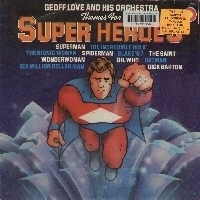 Themes for Superheroes Themes for Superheroes Australian 12" Vinyl / Cassette, 1979: Axis / EMI Australia AXIS 6410 |
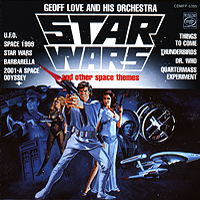 CD, 1997: EMI 6395. Compilation of the Star Wars LP and an earlier Geoff Love album, Close Encounters of the Third Kind and Other Disco Galactic Themes. The CD sleeve was reversible to show either of the two original covers, with the second side reading 'Close Encounters Of the Third Kind and other disco glatactic themes' [sic].
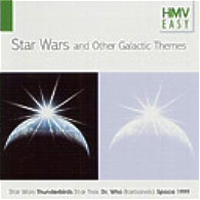 The same compilation was also available from HMV Music in a unique white sleeve, as Star Wars and Other Galactic Themes. | |
/ Geoff Love Biography (Guinness Encyclopedia)
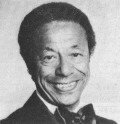
Love, Geoff
b. 4 September 1917, Todmorden, Yorkshire, England,
d. 8 July 1991, London, England.
Love was a musical director, arranger, composer and one of the UK’s most popular easy-listening music personalities. His father, Kid Love, was World Champion sand dancer, and came to the UK from the USA. Geoff Love learned to play the trombone in his local brass band and made his first broadcast in 1937 on Radio Normandy. He moved to the south of England, and played with violinist Jan Ralfini’s Dance Orchestra in London and with the Alan Green Band in Hastings. After six years in the army during World War II, he joined Harry Gold’s Pieces of Eight in 1946, and stayed with them until 1949, providing the vocal on their successful record,
Blue Ribbon Gal.
In 1955, Love formed his own band for the television show
On The Town and soon afterwards started recording for EMI/Columbia with His Orchestra and Concert Orchestra. He had his first hit in 1958, with a cover-version of Perez Prado’s cha-cha-cha
Patricia, and made several albums including
Enchanted Evenings, Our Very Own and
Thanks For The Memory (Academy Award Winning Songs). In 1959, Love started to release some recordings under the pseudonym, Manuel And His Music Of The Mountains, which proved be immensly successful.
Besides his own orchestral records, Love provided the accompaniment and arrangements on record, and in concert, for many popular artists such as Connie Francis, Russ Conway, Paul Robeson, Judy Garland, Frankie Vaughan, Johnny Mathis, Des O’Connor, Ken Dodd, Marlene Dietrich and Gracie Fields.
In the 70s, he formed yet another group, Billy’s Banjo Band, later known as Geoff Love’s Banjo Band, while still having hits under his own name with
Big War Themes, Big Western Movie Themes and
Big Love Movie Themes. He also capitalized on the late 70s dance fad with several volumes of
Geoff Love’s Big Disco Sound, while retaining his more conservative image with
Waltzes With Love and
Tangos With Love. He was consistently popular on radio, and on television, where, besides conducting the orchestra, he was especially effective as a comic foil to Max Bygraves on his
Singalongamax, and similar series. Love’s compositions range from the Latin-styled
La Rosa Negra to the theme for the hit television situation comedy,
Bless This House. His prolific album output included mostly film or television themes.
(c) Guiness Encyclopedia of Popular Music, Guinness Publishing Ltd 1995. No breach of copyright intended.
Geoff Love & His Orchestra were regular cover artists for EMI Records in the 1970s-80s, recording numerous TV and film theme LPs and covering popular songs of the day for cheaper release. They are fondly remembered by many sci-fi fans for their two 70s albums, Star Wars and Close Encounters, which include some of the best orchestral and disco recordings of many cult classics.
His arrangement of the Doctor Who theme remained surprisingly faithful to the 1964 sheet music published by Chappell, with a slightly altered bass line and a melody shared out among the orchestra. The only major deviation came during the breakdown and key change, which were unique to Love's version. The recording sounds crisp and clear, unlike many of the flat-sounding orchestral versions previously released, and it is probably the best version on this page, actually retaining a little of the suspense and drama of the original theme. Thanks to the ever-diligent EMI, who rarely let any of their records slip out of print, it is still readily available.
1980 - Neil Norman and his Cosmic Orchestra

Guitars, synthesizers, theremin: Neil Norman
Keyboards: Les Baxter, Hall Daniels, Bob Kent
Drums: John Guerin, Skip Switzer
Bass: Max Bennett
Trumpets: Buddy Childers, Nelson Matt, Bill Peterson
Trombones: Dick Hyde, Ernie Carlson, Bill Reschenbach
Woodwinds: Fred Selden, Shelly Russel
French horns: Calvin Smith, Bill Alsup, Brien O'Connor
Fluegel horn: Buddy Childers
Percussion: Alan Estes
Harp: Catherine Gotthoffer
Neil's hair: Bobby Hickland |
Neil Norman and his Cosmic Orchestra: Greatest Science Fiction Hits II
US 12" vinyl LP / cassette, 1980
Precision Records / GNP Crescendo
UK CD/LP 1986: GNP Crescendo Records
US CD, October 1992: GNP Crescendo GNPD 2133
1. | Star Wars/Empire Strikes Back |
2. | Voyage To The Bottom Of The Sea
|
3. | Daughter Of The Lesser Moon
|
4. | Sinbad & The Eye Of The Tiger
|
5. | The Time Tunnel
|
6. | Twilight Zone
|
7. | Star Trek The Motion Picture
|
8. | Buck Rogers In The 25th Century
|
9. | War Of The Satellites
|
10. | Vampire Planet
|
11. | Dr. Who
|
12. | The Adventures Of Superman
|
13. | Dark Star
|
14. | March Of The Lizard-Men |
|
--> Additional releases
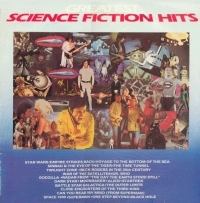 Greatest Science Fiction Hits Greatest Science Fiction Hits UK 12" Vinyl LP, 1981: PRT Records / GNP Crescendo Records NCP 1003. UK compilation of volumes I and II of the Greatest Science Fiction Hits collection. The theme can also be found on a German Neil Norman
compilation, The World of Science Fiction, released by ZYX Music in 1997 (not pictured). |
Neil Norman began guitar sessions while still in high school, performing on records
from the age of 16 and releasing his own LPs before he was 21. As well as playing on over 100
albums (with groups including The Monkees, The Heywoods and Les Baxter), Norman
scored many of his fellow student's film projects while at the UCLA film school, and
recorded his first album, Not of this Earth, out of his love for sci-fi and film.
Later tours with his Cosmic Orchestra (in outlandish costumes and with live special
effects) led to a succession of science fiction albums, Greatest Science Fiction
Hits, and Norman has since produced over 20 Star Trek albums and become overall
producer for GNP/Crescendo Records, a leading sci-fi label. The Neil Norman Cosmic
Orchestra regularly appear at sci-fi conventions in the UK and US, and completed a
worldwide tour in 2000.
Their arrangement of the Doctor Who theme is dreadful. Drawing only on the opening bars of the melody (as if they'd only ever heard the Jon Pertwee/Tom Baker opening titles) and repeating them, nauseatingly, without any differentiation, the recording sounds very synthesised and we have trouble believing the sleeve note's list of instruments.
1984 - Roy Budd conducts the London Symphony Orchestra
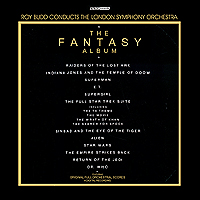
Recorded at CTS Studios, London
Performed by 90 members of the London Symphony Orchestra led by Michael Davis. Conducted by Roy Budd
Producer: Roy Budd
Engineer: Dave Hunt
BBC Records Co-ordinator Alison |
Roy Budd conducts the London Symphony Orchestra: The Fantasy Album
Double 12" vinyl LP in gatefold sleeve/ cassette 1984
BBC Enterprises Ltd. REF 547 / ZCD 547
SIDE 1
1. Raiders of the Lost Ark/Indiana Jones and the Temple of Doom
2. Superman
SIDE 2
1. E.T.
2. Supergirl
SIDE 3
1. The Complete Star Trek Suite
(Comprising the TV Theme, Star Trek - The Movie, The Wrath of Khan, and The Search for Spock)
2. Sinbad and the Eye of the Tiger
3. Alien
SIDE 4
1. Star Wars - The Empire Strikes Back - Return of the Jedi
2. Dr Who |
--> Sleevenotes
Roy was born in London in 1949. He first saw a piano when he was four and a half and immediately began to play, and it was soon apparent that he was something of a child prodigy. Whilst at school, he gave numerous concerts for various charity organisations and made many T.V. appearances. Roy left school at the age of sixteen and although he had received no formal musical training, he embarked upon his chosen profession, show business with the emphasis on music. During the ensuing four years, Roy became a popular Concert, Radio and T.V. performer and won most of the jazz polls of the time as a pianist. He appeared on the top variety shows on radio and T.V. and concert venues included the Palladium and Royal Festival Hall.
When he was twenty, he was invited to compose the music for the movie "Soldier Blue" for AVCO Embassy and this proved to be the first in a long line of themes and scores for major movies and T.V. productions including "The Marseilles Contract", "The Sea Wolves", "Paper Tiger", "Zeppelin", "Who Dares Wins", "The Wild Geese" and he is currently preparing the music for "Wild Geese II"! His career as pianist and conductor has taken him many times around the world to appear in most Western European countries, Australia, U.S.A., Canada, Hong Kong and Latin America with such artistes as Bob Hope, Caterina Valente, Tony Bennett, Charles Aznavour, etc. etc.
Roy is quite justly proud of his latest project which must be the Top Collection of 'Star' (as in Galaxy) Movie Themes. This double album features the London Symphony Orchestra conducted by Roy from most of the original scores provided by the composers themselves.
As he says himself...
"To me, this entire project is a dream come true. It was personally an unparalleled pleasure to conduct such a magnificent orchestra as the LSO, who under Michael Davis's leadership not only played so superbly, but moreover, made it all look so easy which it certainly wasn't. And the sessions were relaxed and humerous to boot! My most sincere thanks and respect go to all ninety members of this wonderful orchestra. Also a special mention about the management team who the public never sees, but who perform their duties in a friendly and most efficient professional manner, from secretaries to Chairman to Henry the Librarian.
Most of the music was conducted from the original scores, and what can anyone say about the talents of composers such as John Williams, James Horner and Jerry Goldsmith. Their music is their own beacon. CTS Studios has a new re-built studio in which these recordings were made. I can only say that for me it is the best studio I have ever recorded in. Lastly the individuals who literally rallied to the flag to get this unique project done, and without whom it probably could not have come to fruition:
GEORGE SALLISS: Copyist; who was looking very tired at the end;
JONATHAN CHANNON: Publisher; an extremely efficient young man whose personal attention and drive was invaluable;
DAVE HUNT assisted by Jonathan Ruttley & Paul Hulme: Engineers; who somehow seem to be able to work all hours but still maintain the best quality available anywhere in the world;
M.B., M.C., N.A.: Solicitors; for whose personal attention beyond the line of duty I am forever grateful;
E.G., E., D., A.B., J.S.: Friends; whose friendship and generous help was both moving and irreplaceable.
David Lloyd: 'Printer'; a 24 hours a day, seven days a week man.
SYLVIA: Guess?; who never faltered in her encouragement even though our apartment got smaller each time another load of music arrived.
Thanks to each and every one."
/ Additional Releases
-
The Final Frontier circa 1984: Mobile Fidelity Sound Lab MFSL 2-188 (LP) / 3-288 (MC) / MFCD 2-831 (CD)
- Film Classics Vol. II CD: Windsong International KOR043
The BBC Records Fantasy Album was never legitimately released, available only in promotional form (copies sent to magazines for review, for example) before cancellation. Copyright dispute - apparently over the Alien theme tune - led to a complete withdrawal of the LP and cassette, though it appears that the same recordings were issued later that year on the Mobile Fidelity label. Many tracks from the resulting Final Frontier album (see Additional Releases, above) were 'borrowed' for subsequent compilations - Doug Payne's online Roy Budd Discography has all the details.
Roy Budd appears to have based his recording on the Eric Winstone Orchestra single of 1964, repeating the 'middle' section of the theme in preference to the more popular opening melody. Budd's orchestration of the theme tune is dramatically different from previous arrangements, with quietened organs and horns leading to a predominantly string-led rendition. Both the bass-line and melody are carried by the string section, with some horns jumping in to give it some volume towards the end. A few woodwinds also pop in to play the melody with some jarring notes along the way, and after a while an organ also appears in the left ear and tinkers away to itself. Budd replaced the Winstone fade-out with his own cheesy ending, later mirrored by John Debney for the 1996 Doctor Who TV Movie.










 Eric Winstone & His Orchestra: Dr. Who
Eric Winstone & His Orchestra: Dr. Who










 Love, Geoff
Love, Geoff

